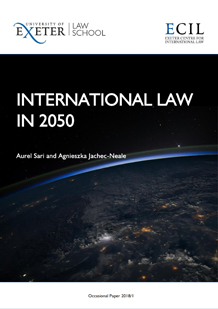
International Law in 2050
The future of international law in 2050
What will international law look like in the year 2050? This is the question addressed by a new occasional paper published by the Exeter Centre for International Law, entitled International Law in 2050.
Predicting the future is an uncertain business, especially at such a distant point in time as thirty years from now. For example, in 1959, few would have foreseen the collapse of communism in Eastern Europe or the fall of the Berlin Wall, which at that point had not even been built yet. We are not very good at predicting specific historic events. However, we can identify trends and drivers that are likely to shape the future and draw certain conclusions from that. For instance, there is little doubt that environmental degradation will have significant ecological impacts which, in turn, will leave their mark on human societies over the next thirty years.
The new paper identifies three overarching legal trends—the globalisation of law, constitutionalisation and fragmentation—that will influence the future of the international legal order. Based on an assessment of these three trends and the trajectories of certain branches of international law, the report suggests that, by the year 2050, the period of classic international law will be drawing to a close. We will have entered a new stage of hybridity where the actors, processes and institutions of classic international law intermingle with a wide range of transnational actors, processes and institutions.
As legal complexity, fragmentation and interdependence increase over time, it will become more difficult for the international community to take deliberate action to adjust elements of the international legal system with the help of the classic tools available. International law will become more vulnerable to acts of non-compliance and subversion by revisionist powers. Certain areas of international law will therefore become more unsettled, in particular the rules governing the use of force. However, this uncertainty and upheaval will not affect all areas of international law. States and international organisations will remain relevant in 2050, but they will share their governance functions and responsibilities with other actors, some formally recognised by international law, others not. The further diffusion of authority in the international legal system thus goes hand-in-hand with the further decline of the authority of the nation State.
The findings of the occasional paper are drawn from a research project on the future development of the law commissioned by the Development, Concepts and Doctrine Centre of the United Kingdom Ministry of Defence in 2017. The research was carried out at Exeter Law School by a group of experts consisting of Catherine Caine, Matthew Channon, Hitoshi Nasu, Michael Schmitt and Helena Wray, led by Aurel Sari and Agnieszka Jachec-Neale.
The paper also draws on the outcome of a workshop hosted by the Exeter Centre for International Law in March 2018 to discuss these research findings. The workshop was meant to capture a range of views and the discussions were not always conclusive. No consensus emerged, for example, as to what the international legal system will look like in 2050. Indeed, the workshop demonstrated that there is ample room for alternative interpretations and diverging visions of the evolution of the international legal system over the next three decades. The event was supported by the Economic and Social Research Council.
Follow this link to access the full text of International Law in 2050.
Date: 21 May 2018
